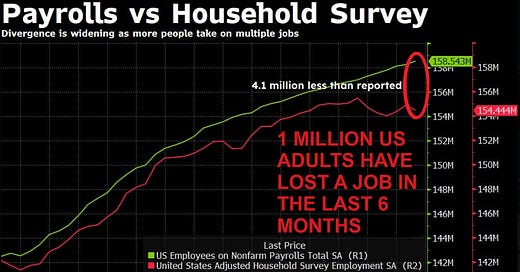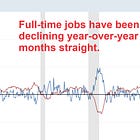Chart of the week: 1 million Americans have lost their job in the last 6 months.
This is all despite the US economy adding 272,000 jobs in May.
On Friday, the Bureau of Labor Statistics released its May jobs report. According to the establishment survey (non-farm payrolls) the US economy created 272,000 jobs in the previous month, above Wall Street analysts’ average estimates of 180,000. At the same time, the unemployment rate rose from 3.9% in April to 4% and average hourly earnings rose 4.1% year-over-year beating estimates of 3.9%.
From the stock and bond market perspective, it was a solid report and it triggered US bond yields to rally and stocks to drop somewhat. Meanwhile, the US dollar strengthened and gold dropped by 3.4%. It was likely a knee-jerk reaction because for the Fed this report does not change much as expectations for the first cut are for September at the earliest. In other words, there will be at least more 3 reports through the summer to see how the labor market changes.
What is staggering is the gap between the non-farm payrolls headline number and the household survey. The difference has already reached a whopping 4.1 million which has never been seen before.
To clarify, the household survey shows an estimate of the number of people employed in the US whereas the establishment survey (payrolls) is an estimated count of jobs. Namely, the household survey does not duplicate vacancies because individuals are counted only once, even if they hold more than one job while the payroll number counts 1 person holding 3 jobs (1 full and 2 part-time) as 3 job additions.
When we look closer at the data it appears that 1 million Americans have become unemployed in the last 6 months (red line on the chart).
This is during the time when all the media headlines claim that the US economy has added jobs for 41 consecutive months.
If you would like to read more about the US labor market reality. Please find the article below analyzing these issues:
If you find it informative and helpful you may consider a paid subscription (or annual if subscribed), buying me a coffee, and following me on Twitter:
Why subscribe?





